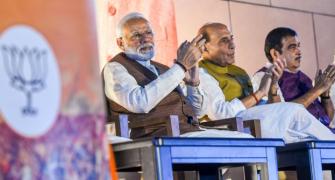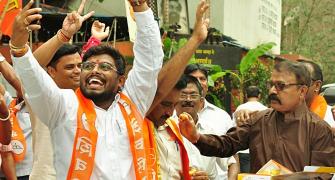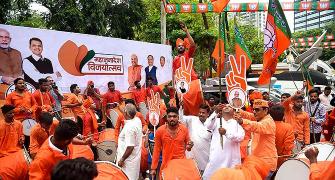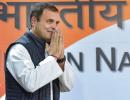But the question before the leadership will be whether to retain the BJP alliance or dump it, says N Sathiya Moorthy.

The ruling AIADMK’s double victory against the rival DMK-Congress combine in the two assembly bypolls and by huge margins has given the party confidence to face the state-wide local bodies elections, which the Tamil Nadu government had sought to delay for years now, citing very imaginative and innovative reasons, despite repeated court directives to the contrary.
Simultaneously, it has also triggered an internal discourse about the wisdom of the party identifying excessively with the ruling BJP and the latter’s ‘Modi magic’, citing it as among the reasons for the massive LS poll debacle earlier this year.
Independent of poll statistics from the past, there is no denying the AIADMK’s superlative performance in the by-elections to the Vikravandi seat in northern Tamil Nadu and in southern Nanguneri. The byelections became due following the death of the DMK incumbent in Vikravandi and the resignation of Congress ally’s H Vasanthakumar, who wrested the southern-most Kanyakumari LS seat from incumbent BJP minister of state, Pon Radhakrishnan, by a huge margin.
In the bargain, AIADMK’s Muthamizhselvan defeated the DMK’s Pugazhenthi by close to 45,000 votes. In Nanguneri, his party colleague, Narayanan won against Ruby Manoharan of the Congress by over 33,000 votes. The latter figures are as impressive as the former, considering that the poll percentage in Nanguneri was 66 per cent against a high 82 per cent in Vikravandi.
For starters, Chief Minister Edappadi K Palaniswami, all smiles before TV news cameras, can now claim that the DMK combine’s LS poll sweep was a ‘fluke’, as he has been saying since then. His deputy and AIADMK coordinator O Panneerselvam did not lose time in declaring that there was no space now in the party for members of the jailed Jayalalithaa aide, V K Sasikala Natarajan.
The twin victories should thus put an end to all internal, lower-level discourses about bringing back the Sasikala family, which is said to be woefully upset with the ruling duo first for sidestepping and sidelining them, and later patching up between themselves to the exclusion of the ‘family’.
Yet, the AIADMK leadership will also be called upon, again from within, to review and reconsider the BJP alliance, both for the local bodies polls, due this year or early next year, and more so for the assembly elections. There is no way the AIADMK can shoo off the BJP for the local bodies polls, from city corporations to village panchayat wards, but an alliance for the assembly polls can cut both ways.
One option now before the AIADMK electoral combine is for its partners to decide to contest the local bodies polls on their own steam.
The PMK, whose contribution to the AIADMK’s Vikravandi victory, and more so the victory margin, is real, may opt for such a course, if only to flex its muscles in the seat-sharing talks for the assembly polls, or even trying to look at other options then.
In a statement, DMK’s M K Stalin said that the party accepted the voter’s verdict. Yet, it may not be as simple as that for his leadership ahead of the assembly polls, due by May 2021. While no one is suggesting that his leadership is under threat after his asserting his position through the LS poll performance, there could be cadre pressure on multiple fronts, including the wisdom of inducting his actor-son Udhayanidhi into electoral politics, so soon after the party living down the destructive image of ‘family rule’ from the past.
There is bound to be multiple pressures, specifically on the DMK reviewing the Congress alliance from the LS polls, though there the leadership may not yield after a point. Given the Congress’s proven 8-10 per cent vote-share for LS polls and at least half as much in the assembly polls, the DMK needs the other as much as the other way round.
For sure, there can be demands from within the DMK to put the Congress and even the Dalit-strong VCK ally from the northern districts, in their place in seat-sharing talks for the local bodies polls. However, given the DMK’s poor showing in Vikravandi, which seat it lost by a bigger margin, the leadership’s manouverability on that score could not be high.
Yet, the DMK leadership should be more confused now than the AIADMK’s post-LS poll. Though it may not be wholly true that the bypolls are a precursor to the assembly polls (unlike the LS elections), there is no denying the role of castes in the two AIADMK victories now.
There can also be no denying the fact that the DMK got it wrong, and lost out in the bargain, by promising ‘internal reservations’ for the Vanniar community for a single seat in Vikravandi, when it was a policy matter that they could have discussed only in a full-fledged election manifesto for a full-fledged assembly elections. The Vanniar community was not impressed, but the equally substantial number of Dalits were depressed.
It was similar in the case of Nanguneri, where again caste combinations did the trick, apart from the ‘hard work’ of AIADMK ministers in both constituencies. In comparison, local-level Congress leaders were reportedly absent from the election scene, as they perceived the party candidate to be an ‘outsider’.
For all this, however, nothing is going to change in the larger picture, between now and the assembly polls, 18 months away. For the AIADMK, the two victorious seats fall outside of the ‘tradiitional sphere of influence’ of EPS and OPS, whose followers are still continuing with the shadow-boxing of the post-Jayalalilthaa days.
For the party to keep up the morale of the cadres and hopes of another assembly poll victory, this one without Jaya, the two main factions should eschew factionalism at all levels. The temptation for EPS, however, would be to depict the twin victories as greater acceptance of his leadership, and therein could lie the seed for future problems for the party.
The DMK too will have to re-discover itself after such a big showing in the LS polls, the first one that the Stalin leadership faced after the death of pater familias, M Karunanidhi. He has to convince the cadres and allies alike that the LS poll victory owed to the AIADMK’s alliance with the BJP but to his own leadership tactics and hard work, which the larger electorate appreciated as much as the cadres.
Between now and the assembly polls, the two sides have very many ways to demonstrate to the voters that they are capable of constructive work, without resorting near exclusively to running down the other, all the time. This has become even more essential, going by the big swing in voter-mood between the LS polls and the by-elections now.
Clearly, it is indicative of a high percentage of ‘undecided, swing voters’ in the two constituencies, and possibly all across the state. Those voters have once again become as much of a deciding factor as they were in the post-MGR electoral era of the nineties. They do not confuse ‘freebies’ of the kind that the urban elite ridicule as ‘wastage’ but they definitely are going to look for more in terms of administrative efficiency and delivery.
In context, incumbent Palaniswami has become the first TN chief minister in decades to undertake an overseas tour to induce big ticket investments to the state. Though the commitments were not as impressive as was made out, the voter would still test it against the performance on the ground, after all the negatives attending on the ‘Global Investors Meet’ of Jayalalithaa and one under his own leadership, since.
There are every day issues of corruption and law and order, where the twin Dravidian majors will continue to contest and contrast each other’s rule, which would make no sense to the GenX voters, who is aware of and alive to, only what he sees and feels on the ground.
The same goes for the state BJP’s post-LS poll anti-Dravidian social media campaign in the local language, aimed at destroying the DMK vote-share and confidence, but possibly to no avail, still.
For now, the state has displayed a balanced approach to political stability, as against the one-sided verdict under Karunanidhi on the one side and MGR/Jaya on the other. In a House of 234 members, the ruling party has 125, including the two seats won now in the bypolls -- seven more than the cut-off figure of 118, yet 11 short of the 136 that ‘Amma’ had won for the party, two of them in bypolls from her ‘hospital bed’.
The rival DMK combine has 109, including six of the Congress and one of the IUML ally. Interestingly, no other major political party has any seat in the House, since elections 2016. By far, this is the highest figure for an Opposition party and combine, after the linguistic reorganisation of states in 1956.
Through the difficult days that the AIADMK faced since Jaya’s death, and the multiple splits and re-union that the party faced, DMK’s Stalin resisted the temptation of seeking to split the ruling party’s legislative win, as if to form an interim alternative till the next elections.
There is some respect left for him on this count outside of the party, though from inside, some critics might still murmur that he was incapable of the swift and effective leadership of the Karunanidhi kind.
There is no reason to suspect the DMK’s intention -- and more so the effectiveness on this score -- now.
Yet, not all problems are out of the way for the AIADMK, at least on paper.
The disqualification case against 11 AIADMK legislators, including deputy CM Panneerselvam is still pending before the courts.
So is one against 21 DMK members.
Indications are that neither side is going to seek fast-tracking of the cases, unless the concerned court registries look into them, as needing to be disposed of before the next assembly polls, at the very least.
In between, and sooner than later, will now come the local bodies polls, where the two parties would vie with equal vigour for clouded figures that would emerge at the end of it -- if only to ensure that their grassroots-level organisations are revived in time for the bigger, and all-important assembly elections, after now proclaiming that Tamil Nadu is still the ‘bastion of Dravidian polity’.
N Sathiya Moorthy, veteran journalist and political analyst, is Distinguished Felllow at Observer Research Foundation, Chennai Initiative.









